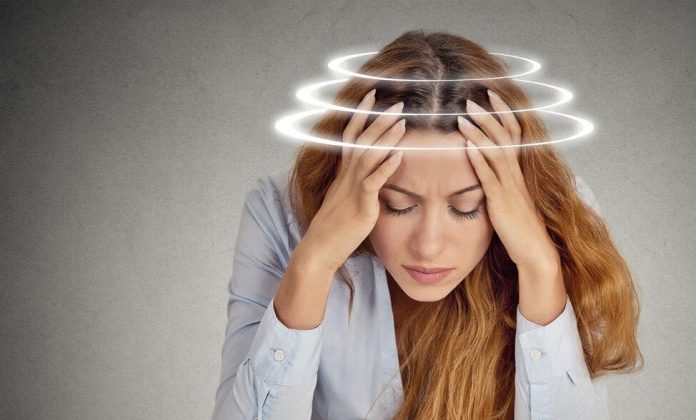Possible causes of dizziness include vertigo, dehydration, hypoglycemia, and neurological conditions. Lifestyle changes and medications are among the most common treatments.
What is dizziness?
Dizziness is the feeling of being lightheaded, woozy, or off-balance. It’s linked to the sensory organs, specifically the eyes and ears, so it can sometimes cause fainting. Dizziness isn’t a disease itself but rather a symptom of various disorders.
Dizziness is common. Occasional dizziness isn’t something to worry about. However, it’s important to call a doctor immediately if you’re experiencing repeated episodes of dizziness for no apparent reason or for a prolonged period.
Dizziness causes
Dizziness has a variety of possible causes.
Vertigo and disequilibrium
True dizziness is the feeling of lightheadedness or nearly fainting.
Vertigo and disequilibrium may both cause a feeling of dizziness, but these two terms describe distinct sensations.
Vertigo is characterized by a spinning sensation, like the room is moving. It may also feel like motion sickness or as if you’re leaning to one side.
Disequilibrium is a loss of balance or equilibrium.
A common cause of vertigo and vertigo-related dizziness is benign positional vertigo (BPV). BPV leads to short-term dizziness when someone changes positions quickly, such as sitting up in bed after lying down.
Dizziness and vertigo can also be triggered by Meniere’s disease. This condition causes fluid to build up in the ear with associated ear fullness, hearing loss, and tinnitus.
Another possible cause of dizziness and vertigo is an acoustic neuroma. This noncancerous tumor forms on the vestibulocochlear nerve (auditory nerve), which connects the inner ear to the brain.
Common causes
Losing too much fluid can result in dehydration, one of the most common causes of dizziness. Symptoms of dehydration include thirst and dry skin.
Other common causes of dizziness include a migraine attack or alcohol.
Dizziness can also result from a problem in the inner ear, which is the area that senses movement and regulates balance. These problems include hearing loss.
Dizziness may be linked to certain medications, too, including:
muscle relaxants
antiepileptic drugs
antihistamines
blood pressure medications
Other possible causes
Some other potential causes of dizziness include:
Sudden drop in blood pressure: Sudden low blood pressure may be caused by various medical conditions or even from standing up (orthostatic hypotension). It can lead to dizziness and falling, especially in older adults.
Cardiomyopathy: In this condition, the heart muscles become rigid and weak and pump less blood. Symptoms can include dizziness, fainting, and trouble breathing.
Heart attack: While chest pain is the most common indicator of a heart attack, dizziness or lightheadedness can also be symptoms. They occur if there’s not enough blood reaching your brain.
Arrhythmia: Arrhythmia occurs when the heart beats at an atypical pace. It can cause dizziness, lightheadedness, or shortness of breath.
Circulation problems: Cardiomyopathy, heart attack, and other heart conditions can result in circulation problems, where your heart is unable to pump enough blood. This can cause you to feel dizzy.
Excessive exercise: Overexerting yourself may make you feel dizzy or lightheaded. It can also lead to dehydration and heat exhaustion, which can both cause dizziness.
Heat exhaustion: If you’re in a hot environment and sweating excessively, you’re likely experiencing heat exhaustion. The condition may make you feel dizzy, thirsty, and weak.
Decrease in blood volume: Low blood volume can result from bleeding or dehydration. It can cause dizziness, fatigue, and low blood pressure. Learn more about the relationship between dehydration and blood pressure.
Anxiety disorders: Dizziness may be related to anxiety with no other physical causes. You may have repeated episodes of dizziness.
Anemia: Anemia is a low red blood cell count. Low levels of iron-rich hemoglobin in your red blood cells mean the cells can’t transport enough oxygen throughout the body. The lack of oxygen caused by anemia may make you feel dizzy, tired, or short of breath.
Hypoglycemia: Hypoglycemia, or low blood sugar, can make you feel shaky, lightheaded, or hungry. Severe hypoglycemia is a serious condition that can cause a seizure. Discover other symptoms associated with hypoglycemia.
Carbon monoxide poisoning: If carbon monoxide fumes from cars, grills, or furnaces build up indoors, breathing them in can be fatal. Dizziness, headache, and vomiting are all symptoms.
Motion sickness: Traveling by car or boat or experiencing other types of motion can give you motion sickness. You may feel dizzy and nauseous.
Multiple sclerosis (MS): Multiple sclerosis (MS) damages the brain and spinal cord. It causes a range of symptoms that can include dizziness.
Parkinson’s disease: Dizziness is a common symptom of Parkinson’s disease, a neurological condition that causes shaking and balance issues. Dizziness may become more noticeable in later stages of Parkinson’s.
Infections: A variety of infections are associated with dizziness. Examples include:
COVID-19: You may feel dizziness and vertigo while you have or recover from COVID-19. The dizziness and vertigo may be associated with headaches and a loss of balance.
Other viral infections: Other viral infections, such as the flu or a cold, may also cause you to feel dizzy or lightheaded. These infections may be associated with dehydration as well.
Ear infection: An ear infection may lead to inflammation in your inner ear, causing dizziness and balance troubles. Ear infections are associated with both bacterial and viral causes.
Labyrinthitis and vestibular neuritis: Labyrinthitis and vestibular neuritis occur when specific nerves in your inner ear become inflamed. Triggers often include viral infections, but they can vary. Bacterial infections are more common in people with labyrinthitis than in people with vestibular neuritis
Symptoms related to dizziness
People who are dizzy may experience various sensations, including:
lightheadedness or faintness
a false sense of spinning
unsteadiness
a loss of balance
a feeling of floating
Sometimes, dizziness is accompanied by nausea, vomiting, or fainting. Seek emergency medical help if you have these symptoms for extended periods.
When to call a doctor about dizziness
It’s important to call a doctor if you have repeated bouts of dizziness. Also, notify a doctor immediately if you experience sudden dizziness along with:
a head injury
a headache
neck stiffness
a high fever
ongoing vomiting
blurred vision
hearing loss
tinnitus
difficulty speaking
numbness or tingling
droopiness of the eye or mouth
loss of consciousness
chest pain
heart palpitations or a low heart rate
These symptoms could indicate a serious health problem, so it’s important to seek medical attention as soon as possible. According to a 2021 Swedish study, 5% of people who used emergency services for dizziness had a time-critical medical issue.
Dizziness treatment
Treatment for dizziness focuses on the underlying cause. In most cases, home remedies and medical treatments can help you manage the underlying cause.
The following are potential treatments for the causes of dizziness:
Vertigo and benign positional vertigo (BPV): BPV, a common cause of vertigo, can often be resolved with the Epley maneuver. This exercise involves turning your head in specific ways to help alleviate symptoms. Surgery is typically not needed, but it’s an option for people who can’t manage their BPV otherwise.
Alcohol: Drinking less alcohol may help you avoid dizziness from overconsumption.
Inner ear issues: You may be able to manage inner ear issues with medications or at-home exercises that help you maintain your balance.
Medications: If medications seem to be causing your dizziness, speak with a doctor about changing your medication or dose.
Sudden drop in blood pressure: Treatment for sudden low blood pressure depends on the cause or underlying condition, but it may involve adjusting your medications, exercising, or changing positions slowly when standing up.
Cardiomyopathy: This condition may be improved with medications or lifestyle changes such as quitting smoking and eating a heart-healthy diet.
Heart attack: A heart attack requires emergency treatment, which may include medications, oxygen therapy, or surgery.
Arrhythmia: Arrhythmia doesn’t always require treatment. Healthy lifestyle choices, such as exercising and eating a balanced diet, can help you manage your symptoms. Heart medications are also available. Surgery is reserved for more serious cases.
Circulation problems: Circulation problems may improve with regular exercise, a heart-healthy diet, medications, or surgery.
Excessive exercise or heat exhaustion: Drinking plenty of fluids can help when dizziness is caused by excessive exercise or heat exhaustion.
Decrease in blood volume: Treatment for low blood volume focuses on restoring fluids through an intravenous (IV) line and treating underlying causes such as bleeding.
Anxiety disorders: Medications and anxiety-reducing techniques, such as therapy, can help with anxiety disorders.
Anemia: Iron supplements, medications, and eating a balanced diet can help treat anemia.
Hypoglycemia: If you have symptoms of hypoglycemia, try drinking fruit juice or soda or taking glucose tablets. For severely low blood glucose levels, you may need an injection of the hormone glucagon. Discover other emergency treatments for hypoglycemia.
Carbon monoxide poisoning: This condition requires immediate medical care. It may be treated with oxygen, a ventilator, and IV fluids.
Motion sickness: You can try ginger candy, aromatherapy, and over-the-counter (OTC) medications such as diphenhydramine (Benadryl) for motion sickness. Learn more about remedies for motion sickness
Multiple sclerosis (MS): This condition currently has no cure, but physical therapy and medications may help with symptoms.
Parkinson’s disease: Medications, surgery, and exercises may improve Parkinson’s disease symptoms, though there is no cure at the moment.
Infections: Treatment will depend on the cause of the infection but will likely include hydration and rest.
Diagnosing the causes of dizziness
A doctor can narrow down the cause of your dizziness by performing a physical examination. They’ll ask you questions about your dizziness, including:
when it occurs
the situations where it occurs
how severe your symptoms are
which other symptoms occur with the dizziness
A doctor may also:
check your eyes and ears
perform a neurological exam
observe your posture
If the doctor suspects certain causes, including carbon monoxide poisoning, heart conditions, or a stroke, they may recommend a CT scan, an MRI, or another imaging test. You may also need additional tests.
In some cases, a doctor can’t determine the cause of dizziness.
Diagnosing the causes of dizziness
A doctor can narrow down the cause of your dizziness by performing a physical examination. They’ll ask you questions about your dizziness, including:
when it occurs
the situations where it occurs
how severe your symptoms are
which other symptoms occur with the dizziness
A doctor may also:
check your eyes and ears
perform a neurological exam
observe your posture
If the doctor suspects certain causes, including carbon monoxide poisoning, heart conditions, or a stroke, they may recommend a CT scan, an MRI, or another imaging test. You may also need additional tests.
In some cases, a doctor can’t determine the cause of dizziness.
They include:
computerized dynamic posturography (CDP) test, where you try to maintain your balance while standing on a moving platform
Romberg test, which measures how well you keep your balance when standing with your eyes closed for 1 minute
electronystagmography (ENG) test, which involves a doctor placing sensors around your eyes and measuring your eye movements
videonystagmography (VNG) test, in which you’ll wear goggles and view light patterns so a doctor can measure your eye movements
rotary test, where goggles record your eye movements while you sit in a rotating, motorized chair
Tests for vertigo
If you have vertigo, the doctor may perform the following tests:
Dix-Hallpike maneuver, which involves turning your head and then switching quickly between lying down and sitting up so a doctor can check if you experience vertigo
vestibular evoked myogenic potentials (VEMP) test, in which a doctor looks for problems in your inner ear by playing sounds into earphones while you move your head and eyes
video head impulse test, which records your eye movements as you try to keep your eyes on a target while moving your head































